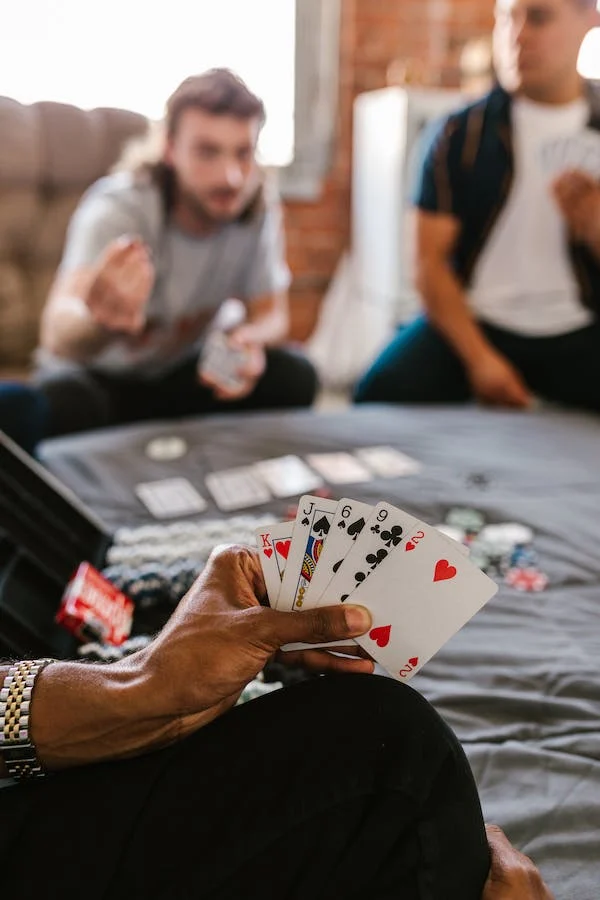Poker psychology is the study of human behavior and decision-making in the context of a poker game. Understanding your opponents’ minds is crucial to becoming a successful poker player. By analyzing their behavior, body language, and betting patterns, you can gain valuable insights into their thought processes and use this information to your advantage. In this article, we will explore the basics of poker psychology and provide tips on how to read your opponents at the table.
The Importance of Reading Your Opponents’ Body Language in Poker
Body language is a nonverbal form of communication that can reveal a lot about a person’s thoughts and emotions. In poker, players use body language to bluff, deceive, and intimidate their opponents. By learning to read your opponents’ body language, you can gain valuable insights into their thought processes and make better decisions at the table.
One of the most common forms of body language in poker is facial expressions. A player’s face can reveal a lot about their emotions, such as happiness, sadness, anger, or frustration. For example, if a player is smiling, they may be confident in their hand, while a frown may indicate a weak hand or a bad beat.
Another important aspect of body language in poker is posture. A player’s posture can reveal their level of confidence, comfort, and engagement in the game. For example, a player who is slouching or leaning back in their chair may be disengaged or uninterested in the game, while a player who is sitting up straight and leaning forward may be focused and attentive.
Gestures and movements are also important forms of body language in poker. For example, a player who is fidgeting or tapping their fingers may be nervous or anxious, while a player who is calm and still may be confident and in control. Similarly, a player who is shaking their head or rolling their eyes may be frustrated or annoyed, while a player who is nodding or smiling may be pleased with the game’s progress.
Reading your opponents’ body language requires careful observation and interpretation. It’s essential to pay attention to their facial expressions, posture, gestures, and movements throughout the game. However, it’s also important to consider the context of the game, such as the stakes, the players’ personalities, and the history of the game.
While reading your opponents’ body language can be a valuable tool in poker, it’s important to remember that it’s not foolproof. Some players may be skilled at hiding their emotions or using fake tells to deceive their opponents. Additionally, some players may intentionally use their body language to mislead their opponents or create a false impression.
To avoid falling for these tricks, it’s important to use body language in conjunction with other forms of observation and analysis. For example, you can use your opponents’ betting patterns, hand histories, and table talk to gain a more comprehensive understanding of their thought processes and decision-making strategies.
In conclusion, reading your opponents’ body language is an essential skill in poker. By learning to interpret their facial expressions, posture, gestures, and movements, you can gain valuable insights into their thoughts and emotions and make better decisions at the table. However, it’s important to use body language in conjunction with other forms of observation and analysis to avoid falling for deception or misdirection. With practice and experience, you can become a skilled reader of your opponents’ minds and gain a competitive edge in the game of poker.
How to Use Verbal Cues to Gain Insight into Your Poker Opponents’ Psychology
Verbal cues are the words and phrases that your opponents use during the game. These cues can reveal a lot about their mindset, emotions, and intentions. By analyzing their verbal cues, you can make more informed decisions and adjust your strategy accordingly.
One common verbal cue is the use of filler words. Filler words are words or phrases that people use to fill gaps in their speech, such as “um,” “ah,” or “like.” When your opponents use filler words, it can indicate that they are uncertain or nervous. This can be a sign that they are not confident in their hand or that they are bluffing. If you notice your opponent using a lot of filler words, it may be a good time to increase your bets and put pressure on them.
Another verbal cue to look out for is the tone of your opponents’ voice. The tone of their voice can reveal a lot about their emotions. For example, if your opponent’s voice is shaky or high-pitched, it may indicate that they are anxious or scared. On the other hand, if their voice is calm and steady, it may indicate that they are confident in their hand. By paying attention to the tone of your opponents’ voice, you can get a sense of their emotional state and adjust your strategy accordingly.
In addition to filler words and tone of voice, the words that your opponents use can also reveal a lot about their mindset. For example, if your opponent uses a lot of negative language, such as “I can’t believe I’m losing again,” it may indicate that they have a defeatist mindset. This can be a sign that they are not playing to win and may be more likely to make mistakes. On the other hand, if your opponent uses positive language, such as “I’m feeling good about this hand,” it may indicate that they are confident and focused. By analyzing the words that your opponents use, you can get a sense of their mindset and adjust your strategy accordingly.
It’s important to note that verbal cues should not be the only factor that you consider when analyzing your opponents’ psychology. Nonverbal cues, such as body language and facial expressions, can also reveal a lot about their mindset. Additionally, it’s important to consider the context of the game and the specific players that you are playing against. Some players may use verbal cues intentionally to deceive their opponents, while others may be more transparent.
In conclusion, understanding your opponents’ psychology is a key component of successful poker play. Verbal cues, such as filler words, tone of voice, and the words that your opponents use, can reveal a lot about their mindset, emotions, and intentions. By paying attention to these cues, you can make more informed decisions and adjust your strategy accordingly. However, it’s important to consider nonverbal cues and the context of the game as well. With practice and observation, you can become more skilled at reading your opponents’ psychology and improving your poker play.
The Role of Emotions in Poker: Understanding How Your Opponents’ Feelings Affect Their Gameplay
Firstly, it is important to understand that emotions play a significant role in poker. Players who are angry, frustrated, or anxious are more likely to make mistakes and take risks that they wouldn’t normally take. On the other hand, players who are calm and composed are more likely to make rational decisions and stick to their game plan.
One of the most common emotions that affect poker players is tilt. Tilt is a state of emotional frustration that occurs when a player experiences a bad beat or a series of losses. When a player is on tilt, they are more likely to make irrational decisions and take unnecessary risks. As a result, they become more predictable and easier to exploit.
To take advantage of a player on tilt, it is important to remain calm and composed. Avoid engaging in any confrontations or arguments that may escalate the situation. Instead, focus on playing your game and making rational decisions. By doing so, you can take advantage of your opponent’s mistakes and increase your chances of winning.
Another emotion that affects poker players is fear. Fear can cause players to play too conservatively and miss out on opportunities to win big pots. Players who are afraid of losing are more likely to fold too often and miss out on valuable opportunities to bluff or make aggressive plays.
To take advantage of a player who is afraid, it is important to be aggressive and take control of the game. By making bold moves and putting pressure on your opponent, you can force them to make mistakes and take risks that they wouldn’t normally take. However, it is important to be careful not to overdo it, as this can backfire and lead to unnecessary losses.
Finally, it is important to understand that emotions can also be used to your advantage. By understanding your opponent’s emotions, you can manipulate them and force them to make mistakes. For example, if you notice that your opponent is on tilt, you can use this to your advantage by making small bets and luring them into making big mistakes.
In conclusion, understanding your opponents’ emotions is a crucial aspect of poker psychology. By understanding how emotions affect gameplay, you can take advantage of your opponents’ mistakes and increase your chances of winning. Remember to remain calm and composed, avoid confrontations, and be aggressive when necessary. With these tips in mind, you can become a master of poker psychology and take your game to the next level.
The Psychology of Bluffing in Poker: How to Spot When Your Opponents Are Trying to Trick You
Bluffing is a fundamental part of poker, and it is essential to understand the psychology behind it. The primary goal of bluffing is to make your opponents believe that you have a better hand than they do. This can be achieved through a variety of techniques, such as betting aggressively, acting confidently, and using body language to convey strength. However, bluffing is not always successful, and it can backfire if your opponents see through your deception.
One of the most important skills in poker is the ability to read your opponents’ body language and facial expressions. When players are bluffing, they often display certain physical cues that can give away their deception. For example, they may avoid eye contact, fidget nervously, or breathe heavily. These signs can be subtle, but they can be crucial in determining whether your opponent is bluffing or not.
Another important aspect of bluffing is understanding your opponents’ playing style. Some players are more likely to bluff than others, and it is essential to identify these players early on in the game. For example, aggressive players who bet frequently are more likely to bluff than passive players who tend to check or call. By understanding your opponents’ playing style, you can better predict when they are likely to bluff and adjust your strategy accordingly.
It is also important to pay attention to the betting patterns of your opponents. When players are bluffing, they often bet more aggressively than they would if they had a strong hand. For example, they may make a large bet on the flop or turn to try to scare their opponents into folding. However, if you notice that your opponent is betting more aggressively than usual, it may be a sign that they are bluffing.
Finally, it is important to trust your instincts when playing poker. While there are many techniques and strategies for identifying when your opponents are bluffing, there is no foolproof method. Sometimes, you just have to rely on your gut feeling and make a judgment call. If you feel that your opponent is bluffing, trust your instincts and make a bold move. However, if you are unsure, it is better to err on the side of caution and fold.
In conclusion, understanding the psychology of bluffing in poker is essential for any serious player. By learning to read your opponents’ body language, understanding their playing style, and paying attention to their betting patterns, you can better predict when they are likely to bluff. However, it is also important to trust your instincts and make a judgment call when necessary. With practice and experience, you can become a master of poker psychology and take your game to the next level.
The Power of Observation: How to Analyze Your Poker Opponents’ Behavior and Use It to Your Advantage
The first step in understanding your opponents’ minds is to pay attention to their behavior. This includes their body language, facial expressions, and verbal cues. For example, if an opponent is fidgeting or tapping their foot, it may indicate nervousness or anxiety. If they are avoiding eye contact, it may suggest they are trying to hide something.
Another important aspect of observation is to take note of your opponents’ betting patterns. Are they aggressive or passive? Do they bet consistently or only when they have a strong hand? By analyzing their betting behavior, you can gain insight into their playing style and adjust your own strategy accordingly.
It’s also important to consider your opponents’ personalities. Are they aggressive or conservative? Are they risk-takers or more cautious? By understanding their personality traits, you can anticipate their moves and make more informed decisions.
Once you have observed your opponents’ behavior, it’s time to use that information to your advantage. One strategy is to bluff your opponents by mimicking their behavior. For example, if an opponent is fidgeting or tapping their foot, you can do the same to make them think you are nervous or unsure of your hand. This can cause them to second-guess their own hand and make a mistake.
Another strategy is to use your opponents’ betting patterns against them. If an opponent is consistently betting when they have a strong hand, you can use this to your advantage by making a large bet when you have a weaker hand. This can cause them to fold or make a smaller bet, giving you the upper hand.
It’s also important to consider your opponents’ personalities when making decisions at the table. If an opponent is conservative and risk-averse, you can use this to your advantage by making a large bet or going all-in. This can cause them to fold, even if they have a strong hand, because they are unwilling to take the risk.
In addition to using observation to your advantage, it’s important to be aware of your own behavior at the table. Avoid giving away too much information through your own body language or verbal cues. Stay calm and composed, even if you have a strong hand, to avoid tipping off your opponents.
In conclusion, understanding your opponents’ minds is a crucial aspect of poker strategy. By observing their behavior, betting patterns, and personality traits, you can gain insight into their playing style and adjust your own strategy accordingly. Use this information to bluff your opponents, use their betting patterns against them, and make informed decisions at the table. Remember to also be aware of your own behavior and avoid giving away too much information. With these strategies, you can become a more successful and strategic poker player. Understanding your opponents’ minds is a crucial aspect of poker psychology. By observing their behavior, body language, and betting patterns, you can gain valuable insights into their thought processes and make more informed decisions at the table. Additionally, being aware of your own emotions and tendencies can help you avoid making impulsive or irrational moves. Ultimately, mastering poker psychology can give you a significant edge over your opponents and increase your chances of success in the game.




